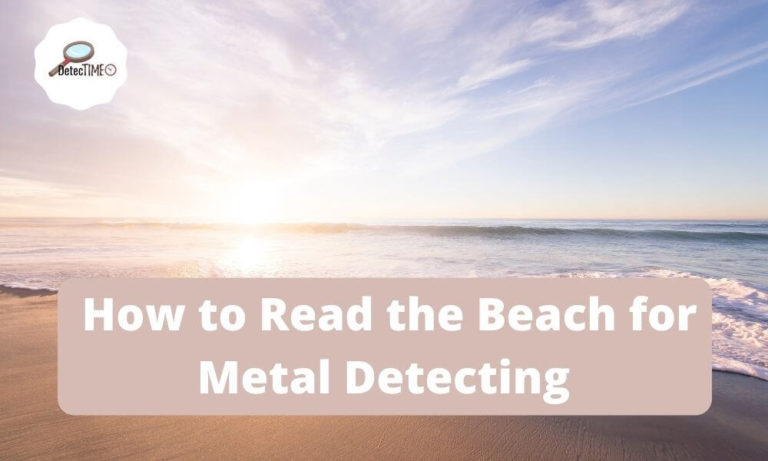Are you wondering how to read the beach for metal detecting? Do you need some help in getting started with this hobby or profession?
Are you a seasoned pro who wants to learn more about what’s new and different that can be done on the beach now, or how to find more treasure using your metal detector? This blog post is going to answer these questions and many others.
The first thing to do before metal detecting on the beach is finding some reliable information about your chosen area. There’re many websites with maps that you peruse, and they offer detailed reports from other treasure hunters. It’s best to avoid metal detecting on totally unfamiliar grounds.
One website I recommend checking out is called Geocaching Maps. It offers a map of all geocaches within a 100km radius of an address or GPS coordinates.
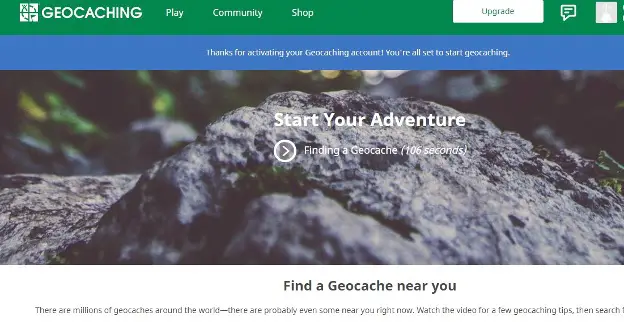
Additionally, it caches people within their own vicinity, so it’s easy to find where others have been successful at hunting down treasures buried beneath sand and water.
The best feature of Geocaching is its integrated Google Earth satellite imagery if you want to get more of a bird’s eye view.

Another website with great information is Beachcomber’s Journal, which provides treasure hunting articles. It also publishes useful resources regarding tide charts and beach safety warnings. These insights are crucial for the treasure hunter in you.
One thing I learned from reading through this site is not to be discouraged by mine shafts dug up on the shoreline. Roughed-up places also have hidden treasures that you could discover!
How do they know? That’s because, unlike modern-day man-made objects such as coins, jewelry, or glassware, these items were mined out long ago. So, there would be nothing left but empty holes.
Don’t think it means no treasures exist at all in such locations. It just means that there are a lot fewer of them.
The next thing is the actual metal detecting process on the beach. How do you know if your chosen spot has been well-explored by others?
You’d probably prefer using Google Earth whenever you’re conducting your own independent research.
Use it to see whether any flags have been placed in the areas where treasures were found already. Check for other indications of treasure hunting activity like caved-in holes, shovel marks, and dug-up piles of sand.
Those are obvious signs that someone’s taken out their find for examination before going back to try ferreting more items from the earth below.
Once you’ve found a promising location with no signs indicating anyone else has hunted there yet, take a walk along the coastlines. Be patient until you find an area that is mostly flat. It should feature a moderate slope, and it shouldn’t have too many rocks or other impediments.
Next, you must find out what type of metal detector to use on the beach – it’s crucial for success. Different metals give varying frequencies as they deflect the electromagnetic fields of your detector. Thus, you’ll need to know more about tuning different specialized detectors.
Do your research beforehand so as to avoid buying a metal detector that will produce false positives (i.e., lots of beeping but nothing in return.) All the items buried deep down are made of iron-based materials like coins, jewelry and other valuables.
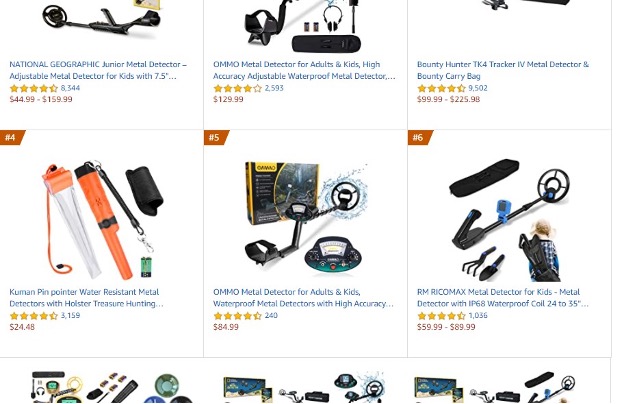
Some objects like glassware also contain traces of iron, so they also generate signals when you pass an electromagnetic field (EMF) detector over them.
The next thing you want to do is prepare for a day of metal detecting on the beach by going through some good tips and tricks! This blog post will answer the questions that beach treasure hunters ask most frequently. Hold on tight because you won’t want to miss a single detail.
What should you use to detect metal on the beach?
You should use a waterproof coil to detect metal on the beach because of all the water and wet sand. Waterproof metal detectors empower you to beat the edge along the waterline without malfunctioning. That way, you can search for treasures in the water and onshore.
How to set up your detector before you start, and after you finish a day of treasure hunting. The following tips will help you get the best out of your beach metal detecting equipment.
At any time, what tells you that your metal detecting coil is effective? The most important thing is how well it can spot a buried treasure on damp sand or in the surf.
The best detector types for beach hunting are the most advanced models with good, reliable discrimination and depth.
When choosing your detector, also ask yourself the following questions:
- How often do you have to replace your coil?
- How long will your battery last?
- How often will you have to replace the search coil cover or rubber booties on the shaft of your detector for wet sand hunting?
Every metal detector is different, but most of them will have a few basic settings that you need to know about. How sensitive your machine is can be changed by turning the discrimination knob either clockwise or counter-clockwise in order to adjust it.
The ground balance needs to be adjusted prior to detecting as well, usually with some sort of button on the machine, and this is done by trying to find a “sweet spot” in close proximity (usually about one foot) with your detector turned on.
I’m ready to hit the beach for a metal detecting mission. What now?
What you need:
- A detector with a good coil to search deep and accurately
- Comfortable boots or shoes that can stand up to water, sand, mud and rocks
- Sturdy work gloves for handling sharp objects like glass fragments on the beach
Additionally, it would help to have other appliances and equipment to detect metal on the beach. The most essential tools that you should take with you include:
- Headset
Your detector will make buzzing sounds when it detects metals. Headsets allow you to read the beach. Wearing headsets helps you to avoid drawing unwanted attention to your exciting finds.
- Sand scoop
Once you get a signal, you should use your sand scoop to unearth and scoop the buried metal. Then, shake it to sift the sand and isolate the valuable item.
- Diggers’ pouch
Many beginners overlook the importance of getting a diggers’ pouch. The pouch should have one pocket for valuables and another for your trash. Thus, it’s never a great idea to litter the beach.
- Pinpointer
Pinpointers save your time, and you don’t need to keep sifting through the sand. You’ll always enjoy increased accuracy and time efficiency whenever you go with a pinpointer for metal detecting.
How Much Battery Capacity Does My Metal Detector Have?
Makers generally specify how much time it takes for an individual charge to run out. This information can usually be found on the product packaging or within its accompanying manual.
For example, Garrett claims that their GPX5000 has up to 12 hours of continuous use per fully charged lithium-ion pack(s). Thus, they are good to go for about two days of detecting.
Which is the best part of the beach for metal detecting?
When starting out, most hobbyists wonder where to begin sweeping when looking for treasure on vast beaches. Fortunately, I’m here to offer helpful tips.
Beaches border either fresh or salty water bodies. The first step of reading any beach is analyzing its sand and surf.
The best parts of the beach to find metals include:
- Sloughs
- Scallops
- Low-lying pockets
- Humps
- Sand cut-outs
Also, check low-lying areas that have been eroded recently by tides or wind. Metal items like coins and jewelry often accumulate in such pockets.

Cut-outs in the sand and humps on the beach are other probable areas to find generous metal deposits. Apart from targeting sloughs and scallops, it’s also a no-brainer that you’re likely to find valuable metals around the most popular parts of the beach. Tourists get lousy around the beach and often leave behind metals such as:
- Bracelets
- Coins
- Rings
- Necklaces and pendants
- Wristwatches
Popular beach spots include cabanas, water edges, and other high-traffic areas.
It’s also worth noting that the sea always gravitates towards one side of the beach. Always start by checking the side with the finest sand. Most of the lost valuables move to that side along with the fine sand.
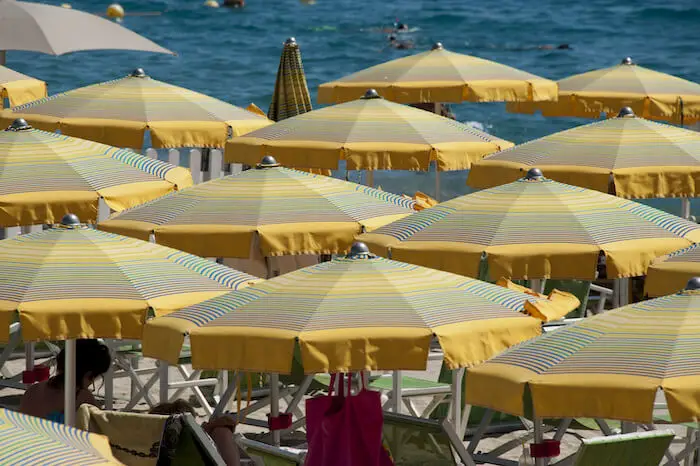
How Fast Should I Walk When Detecting Metal on a Public Beach?
Metal detectors should be used in a slow, sweeping motion. Beach metal detecting is dangerous enough without walking too fast and missing treasure!
The average battery life of your metal detector’s batteries will last anywhere from one to three hours. However, it depends on the model you purchase. A detector with higher capacity may have a longer battery life as well.
What is the best time for beach metal detecting?
The best way to plan your beach reading is to study and foretell tide movements. You’ll find it highly rewarding to hunt for treasures after violent storms.
The best time to detect metal on the beach is during the low tide. With experience, you can study wind patterns, moon phases, and tides when deciding the most opportune moment for beach metal detecting. But if you’re just starting, you can always wait when the beach has few people on it.
It could take some research to understand the tides, but the effort pays off big time! Beach lines are subject to tides that are affected by:
- The moon
- Weather patterns
- Seasonal changes
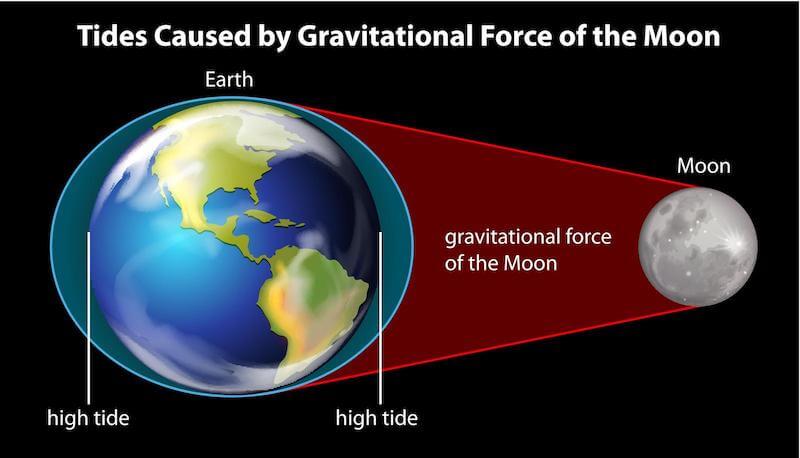
Every day comes with two low tides and two high tides. During low tides, the water retreats, making the beach more spacious.
You also need to be at the best spots first before other treasure hunters beat you to the chase.
However, don’t be in a rush to search the wet sands if the tide could come back rushing. Many people die trying to be the first after the high tide subsides. Make sure there are some people on the beach in case the returning waves catch you off guard.
Is it worth it to detect metals on beaches?
Metal detecting on beaches is worth it because the beach is the best way to find lost treasures. I bet that hunting for valuable items on the beach is a highly profitable use of metal detectors.
People are always flocking on beaches and losing their valuables in the shifting sand. Beaches are the best places to discover lost rings, rubies, coins, and metal scrap. Thus, you can make beach times profitable by taking up the treasure hunting hobby.
People love beaches because of the oceanic breeze, trees, and breathtaking sceneries. Treasure hunters have another compelling reason to love the beaches, other than the thrill of meeting vacationers and exotic tourists.
It’s a total waste to live close to the beach and not know how to read beaches. You should also acquire the skill if you like vacationing around sandy resorts and surfing on oceanic tides.
Rings slip out of your fingers when the coastal temperatures numb your fingers. Sailors and tourists keep losing their rings to the beach, especially during chilly nights. You can even find ruby rings that have been lost underground for decades.
Don’t despair if you keep finding coins. You can collect a sack load of coins if you specialize on busy beaches. People are always losing coins while undressing or changing clothes at the beach.
Stop wondering if metal detecting on the beach is profitable. With patience, you can turn in significant profits from the following specialties:
- Mineral hunting
- Relic hunting
- Beachcombing
- Coin shooting
Treasure hunting will fulfill you to a great extent, if it’s truly your hobby. Yes, It helps to think about profitability. However, my main concern has always been having fun.
This hobby is quite cathartic. You’ll enjoy coastal breezes and sweet sunshine. Apart from the friendly environment, you’ll also experience the joy of solving mysteries and unearthing hidden histories.
Research makes it more rewarding to know how to read beaches. You can tell where the towel lines are and how crowds roam target beaches.
However, research goes with patience. You’ll come across lots of buried beer cans, foil sheets, and more scrap metal. Patience also helps you pick up one coin after the other, until you end up with a sack load of valuables.
Do you need a license to metal detect on the beach?
Different states, counties, and cities impose varying regulations on beach metal hunting. You should always find out the laws and regulations that apply to the area you’d like to go treasure hunting.
Most regulations apply to public beaches. Of course, you can’t go treasure hunting on private beaches without seeking consent from the owners. Most public beaches allow you to detect metals without any permits.
However, you still ask around to find out the rules governing specific beaches.
Why is it crucial for treasure hunters to master beach metal detecting?
It’s crucial for treasure hunters to master beach metal detecting because beaches never lack valuables lost in the sands. Metal detecting is relaxing, and it makes excellent physical exercise for adults and seniors.
Treasure hunting on beaches makes the hobby fun because your chances of finding something pricey are always higher.

